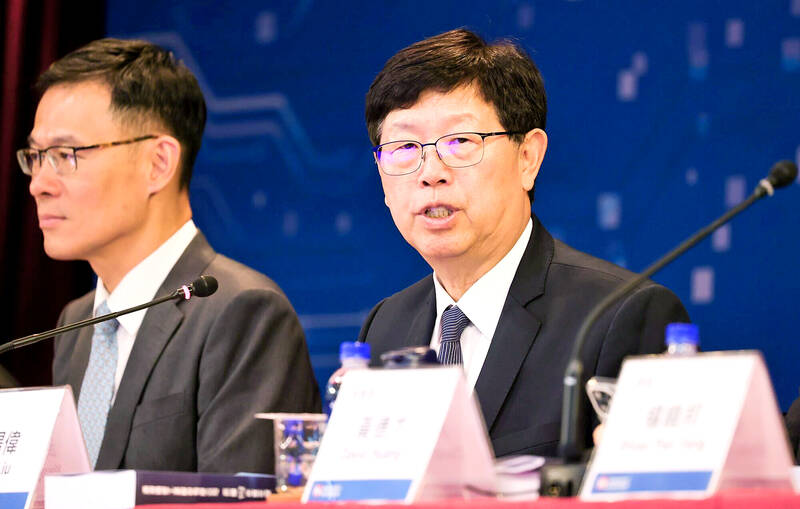Hon Hai Precision Industry Co (鴻海精密) yesterday said revenue is to rise and surpass NT$7 trillion (US$215.92 billion) next year, driven by a surge in demand for artificial intelligence (AI)-enabled servers.
That means overall revenue would swell about 13.64 percent in the two-year period to next year, compared with NT$6.16 trillion generated last year.
Hon Hai attributed the revenue growth to rapidly growing AI server revenue.

Photo: I-Hwa Cheng, Bloomberg
About NT$1 trillion of the revenue next year would come from AI servers, more than triple the NT$300 billion last year, Hon Hai chairman Young Liu (劉揚偉) said.
AI server revenue would soar about 40 percent this year compared with last year, Liu said.
Hon Hai is to ship the first batch of AI servers powered by Nvidia’s latest AI chip, the GB200, in the second half of this year.
“AI servers will become the next NT$1 trillion segment,” Liu told shareholders at the firm’s annual general meeting. “Last year, the group made more than NT$6 trillion [in revenue]. Because of AI, in the near term, we look to reach NT$7 trillion.”
AI servers are one of the key growth drivers for Hon Hai, Liu said.
The AI industry would exceed US$100 trillion over the longer term, Liu quoted Nvidia Corp CEO Jensen Huang (黃仁勳) as saying during a dinner with local AI server partners.
Some research houses forecast the global AI industry is to expand to more than US$1 trillion in revenue in the next seven or eight years, with half of the amount coming from hardware, Liu said.
Talking about Hon Hai’s partnerships with Nvidia, Liu said that the company plans to showcase its first electric vehicle software platform, HHEV.OS, in October.
Hon Hai is also collaborating with Nvidia in developing generative AI software for electric cars and creating robotic manufacturing systems with AI features, he said.
Hon Hai has made progress in growing its electric vehicle business and is set to land new supply contracts with two traditional automakers from Japan in the second half of this year, Liu said.
The company seeks orders to make electric cars for other automakers.
After multiple years of efforts to sell its electric vehicles overseas, Hon Hai said it expects its electric cars to become available in Southern Asian countries soon.
Next year, its electric vehicles would hit the US market, the company added.
In response to shareholders’ concern about Sharp Corp’s exit from the display market and its impact on Hon Hai, Liu said that Hon Hai would play a more active role in the Japanese company’s management and board, following a major reshuffle this month.
Hon Hai is the biggest shareholder of Sharp, owning a stake of about 34 percent.
Shareholders of Hon Hai yesterday approved a cash dividend distribution of NT$5.4 per share, the highest since 1991. That represented a payout ratio of 52.68 percent, compared with Hon Hai’s earnings per share of NT$10.25.

Intel Corp chief executive officer Lip-Bu Tan (陳立武) is expected to meet with Taiwanese suppliers next month in conjunction with the opening of the Computex Taipei trade show, supply chain sources said on Monday. The visit, the first for Tan to Taiwan since assuming his new post last month, would be aimed at enhancing Intel’s ties with suppliers in Taiwan as he attempts to help turn around the struggling US chipmaker, the sources said. Tan is to hold a banquet to celebrate Intel’s 40-year presence in Taiwan before Computex opens on May 20 and invite dozens of Taiwanese suppliers to exchange views

Application-specific integrated circuit designer Faraday Technology Corp (智原) yesterday said that although revenue this quarter would decline 30 percent from last quarter, it retained its full-year forecast of revenue growth of 100 percent. The company attributed the quarterly drop to a slowdown in customers’ production of chips using Faraday’s advanced packaging technology. The company is still confident about its revenue growth this year, given its strong “design-win” — or the projects it won to help customers design their chips, Faraday president Steve Wang (王國雍) told an online earnings conference. “The design-win this year is better than we expected. We believe we will win

Chizuko Kimura has become the first female sushi chef in the world to win a Michelin star, fulfilling a promise she made to her dying husband to continue his legacy. The 54-year-old Japanese chef regained the Michelin star her late husband, Shunei Kimura, won three years ago for their Sushi Shunei restaurant in Paris. For Shunei Kimura, the star was a dream come true. However, the joy was short-lived. He died from cancer just three months later in June 2022. He was 65. The following year, the restaurant in the heart of Montmartre lost its star rating. Chizuko Kimura insisted that the new star is still down

While China’s leaders use their economic and political might to fight US President Donald Trump’s trade war “to the end,” its army of social media soldiers are embarking on a more humorous campaign online. Trump’s tariff blitz has seen Washington and Beijing impose eye-watering duties on imports from the other, fanning a standoff between the economic superpowers that has sparked global recession fears and sent markets into a tailspin. Trump says his policy is a response to years of being “ripped off” by other countries and aims to bring manufacturing to the US, forcing companies to employ US workers. However, China’s online warriors